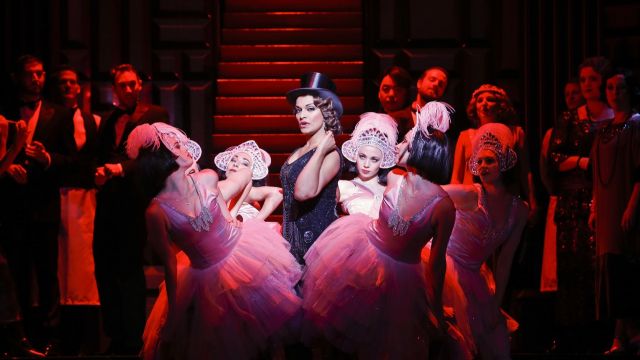The Merry Widow
When asked to direct a season of The Merry Widow some years ago, I studied various unsatisfactory translations before opting for The Merry Widow of Bluegum Creek, set in the Australian embassy in Paris. It was very funny.
Opera Australia opted for a new translation prepared for Western Australian Opera by Justin Fleming, and it was also very funny. The Pontevedrians all had Australian accents and much of the humour had an Aussie feel, without any mention of kangaroos. It went down well with the opening night audience.
All the publicity had surrounded the Widow, Danielle de Niese, an Australian who moved to America as a child and has been singing in major houses all over the world. A stunning woman with a lovely voice, she also moved well, though often sacrificed vocal line for exaggerated diction.
 Arguably she was outshone by her Danilo. Alexander Lewis studied at WAAPA and, after some music theatre roles and success in competitions, joined the young artist program at the Metropolitan Opera in New York. His full throated free tenor was a constant delight, and he presented a dishevelled, charming lover.
Arguably she was outshone by her Danilo. Alexander Lewis studied at WAAPA and, after some music theatre roles and success in competitions, joined the young artist program at the Metropolitan Opera in New York. His full throated free tenor was a constant delight, and he presented a dishevelled, charming lover.
Both were accomplished dancers, and the sexual chemistry between the two was exciting. The Widow has long passages with no singing, and director Graeme Murphy made sure the tension was maintained. The direction was very good. It was quite a coup to entice these two ex-pats back to our country.
Diminutive soprano Stacey Alleaume was a sexy Valencienne and John Longmuir more a stuffed-shirt Camille, rather than the usual rogue. Both sang exceptionally well. Actor David Whitney was a suitably bumbling Baron Zeta and Richard Anderson and Brad Cooper suitably over the top as the two French suitors.
Having a dancer as the director meant that there was a large dance troupe, and they entertained with some stunning routines. The set was impressive and the lighting effective. The costumes were magnificent.
The one controversial aspect was the use of amplification. This wasn’t subtle use to augment the weaker voices, but full on as you expect at a music theatre performance. It was well balanced, so that all the words could be clearly heard, though sur-titles were employed as well but, as a regular opera goer, I would have preferred to hear the voices au naturale.
However, this was a very entertaining night at the operetta.
Graham Ford
Photographer: Jeff Busby

Subscribe to our E-Newsletter, buy our latest print edition or find a Performing Arts book at Book Nook.

